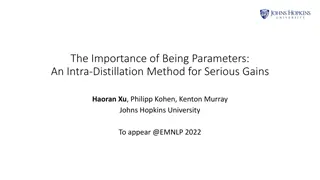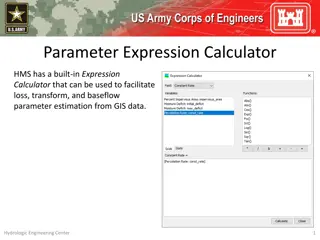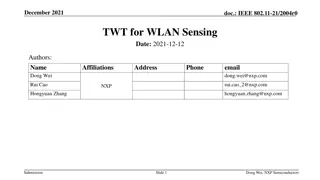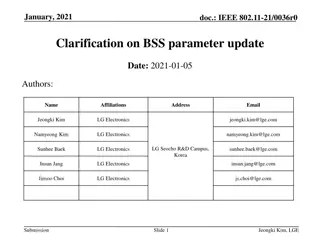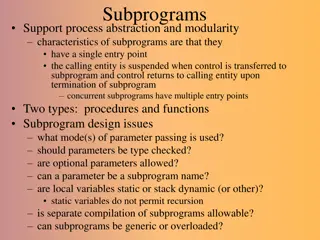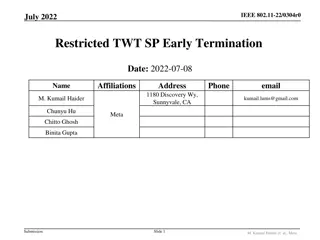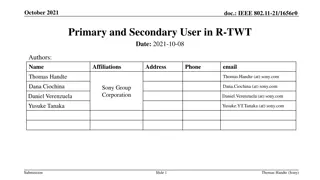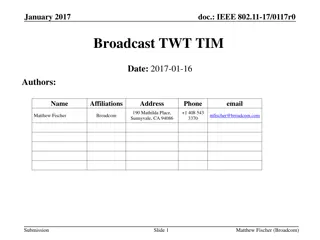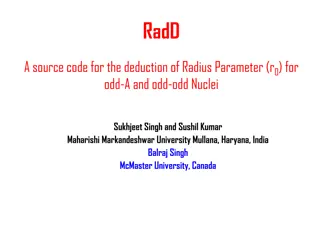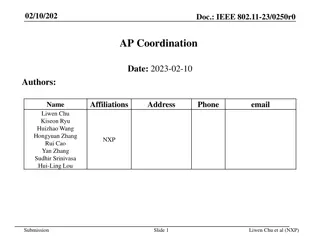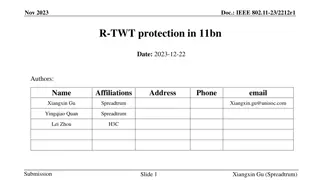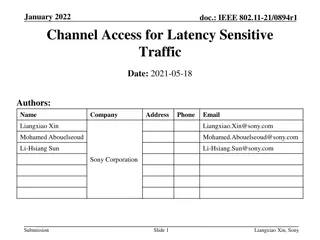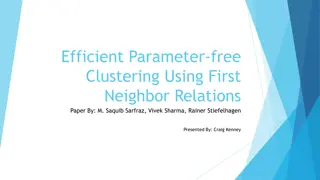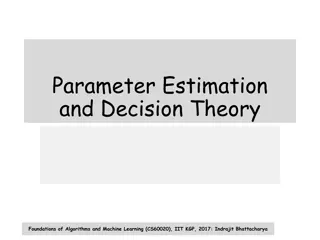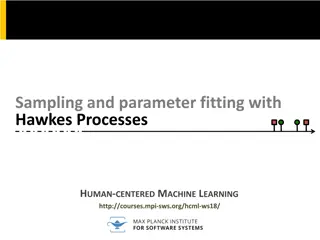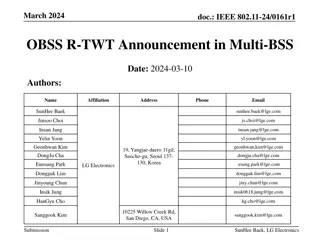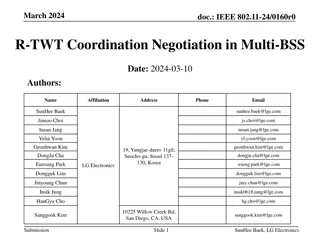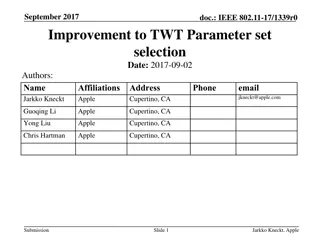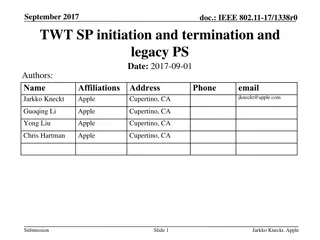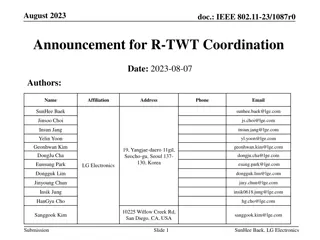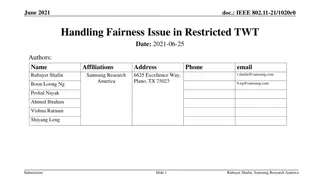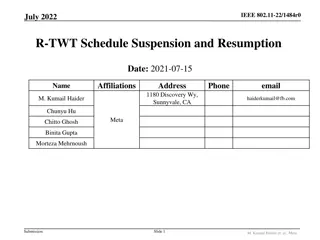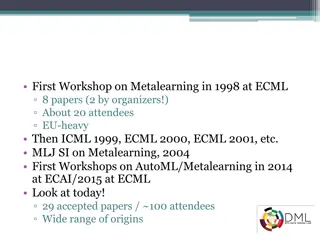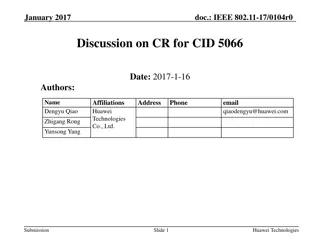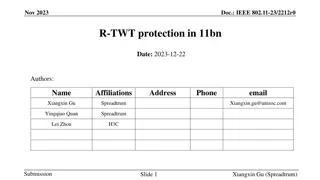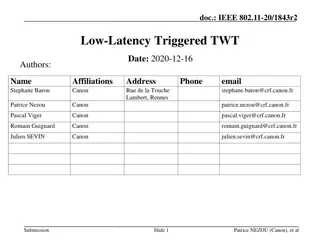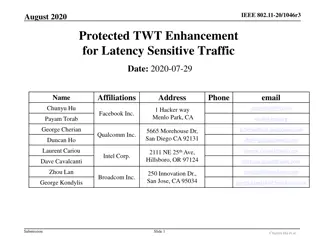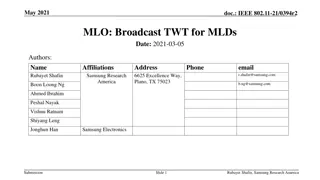Coordinated R-TWT Protection in Multi-BSS
The protection of Restricted Transmitting Using Time Window (R-TWT) service periods in a multi-BSS environment, where overlapping BSSs can affect the latency-sensitive traffic exchange. It proposes methods to coordinate R-TWT service periods and receive schedule information for neighboring BSSs.
3 views • 11 slides
Intra-Distillation for Parameter Optimization
Explore the concept of parameter contribution in machine learning models and discuss the importance of balancing parameters for optimal performance. Introduce an intra-distillation method to train and utilize potentially redundant parameters effectively. A case study on knowledge distillation illust
8 views • 31 slides
Parameter and Feature Recommendations for NBA-UWB MMS Operations
This document presents recommendations for parameter and feature sets to enhance the NBA-UWB MMS operations, focusing on lowering testing costs and enabling smoother interoperations. Key aspects covered include interference mitigation techniques, coexistence improvements, enhanced ranging capabiliti
4 views • 18 slides
Enhancing R-TWT with Multi-AP Coordination in IEEE 802.11 Networks
Delve into the world of IEEE 802.11 wireless networks as this document explores solutions for multi-AP coordination for R-TWT, focusing on improving tail latency, jitter, and medium protection. Enhancements in R-TWT operation, coordination scenarios, and solutions for multi-AP deployments are discus
1 views • 12 slides
Parameter Expression Calculator for Efficient Parameter Estimation from GIS Data
Parameter Expression Calculator within HEC-HMS offers a convenient tool to estimate loss, transform, and baseflow parameters using GIS data. It includes various options such as Deficit and Constant Loss, Green and Ampt Transform, Mod Clark Transform, Clark Transform, S-Graph, and Linear Reservoir. U
3 views • 5 slides
IEEE 802.11-21/2004r0 Target Wake Time (TWT) for WLAN Sensing
This technical document delves into the implementation of Target Wake Time (TWT) in wireless local area networks (WLAN) for efficient power management in sensing devices. It explores the significance of TWT in minimizing contention among stations, reducing power consumption, and optimizing wake sche
0 views • 14 slides
IEEE 802.11-21/0036r0 BSS Parameter Update Clarification
This document delves into the IEEE 802.11-21/0036r0 standard, specifically focusing on the BSS parameter update procedure within TGbe D0.2. It details how an AP within an AP MLD transmits Change Sequence fields, Critical Update Flags, and other essential elements in Beacon and Probe Response frames.
2 views • 11 slides
S-Parameter Measurements in Microwave Engineering
S-Parameter measurements in microwave engineering are typically conducted using a Vector Network Analyzer (VNA) to analyze the behavior of devices under test (DUT) at microwave frequencies. These measurements involve the use of error boxes, calibration techniques, and de-embedding processes to extra
1 views • 20 slides
Overview of Subprograms in Software Development
Subprograms in software development provide a means for abstraction and modularity, with characteristics like single entry points, suspension of calling entities, and return of control upon termination. They encompass procedures and functions, raising design considerations such as parameter passing
5 views • 25 slides
Enhancements for TWT SP Early Termination in IEEE 802.11-22/0304r0
In the IEEE 802.11-22/0304r0 document, enhancements are proposed for supporting latency-sensitive traffic by introducing additional improvements to the TWT SP early termination feature. These enhancements aim to facilitate efficient termination of the restricted TWT SP, allowing STAs to enter the do
0 views • 17 slides
IEEE 802.11-21/1656r0: Primary and Secondary User in R-TWT
In October 2021, the document IEEE 802.11-21/1656r0 discusses the usage of R-TWT for low-latency services in 11be TGbe networks. It addresses the coexistence with legacy STAs, transmission delays, and the design challenges related to R-TWT service periods. Various related submissions and CIDs are hi
0 views • 15 slides
Enhancing Ecological Sustainability through Gamified Machine Learning
Improving human-computer interactions with gamification can help understand ecological sustainability better by parameterizing complex models. Allometric Trophic Network models analyze energy flow and biomass dynamics, but face challenges in parameterization. The Convergence Game in World of Balance
1 views • 12 slides
Enhancing 802.11 Scheduling with Broadcast TWT and TIM Mechanisms
The January 2017 document IEEE 802.11-17/0117r0 discusses the implementation of coordinated multi-user downlink and triggered multi-user uplink in 802.11 systems to improve scheduling and reduce collisions. It proposes aligning power saving wake times using Target Wake Time (TWT) for better efficien
3 views • 17 slides
Code Assignment for Deduction of Radius Parameter (r0) in Odd-A and Odd-Odd Nuclei
This code assignment focuses on deducing the radius parameter (r0) for Odd-A and Odd-Odd nuclei by utilizing even-even radii data from 1998Ak04 input. Developed by Sukhjeet Singh and Balraj Singh, the code utilizes a specific deduction procedure to calculate radius parameters for nuclei falling with
1 views • 12 slides
Enhanced AP Coordination in IEEE 802.11 Networks
The document discusses the implementation of Restricted Transmit Wait Time (R-TWT) scheduling in IEEE 802.11 networks. It covers topics such as AP coordination, announcement of R-TWT schedules by APs, usage of 1-hop and 2-hop neighbor information for scheduling, and STA's notification of neighbor AP
0 views • 7 slides
Learning to Rank in Information Retrieval: Methods and Optimization
In the field of information retrieval, learning to rank involves optimizing ranking functions using various models like VSM, PageRank, and more. Parameter tuning is crucial for optimizing ranking performance, treated as an optimization problem. The ranking process is viewed as a learning problem whe
1 views • 12 slides
Proposal for R-TWT Protection in IEEE 802.11-23/2212r1 11bn
A detailed discussion on considerations and proposals for R-TWT Signal Protection in 11bn networks is provided in this document. It covers topics like protection between neighboring APs, different OBSS R-TWT SPs for STAs, proposals for APs and STAs in a BSS, concluding with the importance of conside
0 views • 6 slides
Enhancing Channel Access for Latency-Sensitive Traffic in January 2022
In the documentation IEEE 802.11-21/0894r1, the focus is on improving channel access for latency-sensitive traffic through concepts like Restricted TWT (Target Wake Time). The proposal suggests methods to protect TWT Service Periods from non-TWT scheduled STAs, ensuring prioritized transmission of l
0 views • 11 slides
Efficient Parameter-free Clustering Using First Neighbor Relations
Clustering is a fundamental pre-Deep Learning Machine Learning method for grouping similar data points. This paper introduces an innovative parameter-free clustering algorithm that eliminates the need for human-assigned parameters, such as the target number of clusters (K). By leveraging first neigh
0 views • 22 slides
CEPC Partial Double Ring Parameter Update
The CEPC Partial Double Ring Layout features advantages like accommodating more bunches at Z/W energy, reducing AC power with crab waist collision, and unique machine constraints based on given parameters. The provided parameter choices and updates aim to optimize beam-beam effects, emittance growth
0 views • 14 slides
Foundations of Parameter Estimation and Decision Theory in Machine Learning
Explore the foundations of parameter estimation and decision theory in machine learning through topics such as frequentist estimation, properties of estimators, Bayesian parameter estimation, and maximum likelihood estimator. Understand concepts like consistency, bias-variance trade-off, and the Bay
0 views • 15 slides
Sampling and Parameter Fitting with Hawkes Processes
Learn about sampling and parameter fitting with Hawkes processes in the context of human-centered machine learning. Understand the importance of fitting parameters and sampling raw data event times. Explore the characteristics and fitting methods of Hawkes processes, along with coding assignments an
1 views • 20 slides
IEEE 802.11-24/0161r1 OBSS R-TWT Announcement in Multi-BSS
The document discusses the coordination of R-TWT schedules in Multi-BSS to enhance operation and protection. It covers how APs announce OBSS R-TWT schedules to associated STAs, ensuring efficient transmission of latency-sensitive traffic. Methods for announcing OBSS R-TWT schedules to EHT STAs and U
0 views • 13 slides
R-TWT Coordination Negotiation in Multi-BSS Networks
This document discusses the coordination negotiation process for R-TWT schedules in Multi-BSS networks to minimize interference between Access Points (APs). It outlines the overview, signaling methods, and importance of coordinated R-TWT schedules in improving network efficiency.
0 views • 16 slides
Enhancement of TWT Parameter Set Selection in September 2017
Submission in September 2017 proposes improvements in TWT parameter selection for IEEE 802.11 networks. It allows TWT requesting STAs to signal repeat times, enhancing transmission reliability and reducing overheads. Non-AP STA challenges and current TWT setup signaling are addressed, providing a me
0 views • 12 slides
IEEE 802.11-17/1338r0 - September 2017 TWT SP Initiation and Termination
This document, authored by Jarkko Kneckt from Apple, discusses the September 2017 TWT SP initiation and termination processes, focusing on high throughput and power efficiency for 802.11ax devices. Legacy power save mechanisms in parallel with TWT mechanisms are explored, along with issues related t
0 views • 15 slides
Announcement of OBSS R-TWT Coordination in Multi-BSS Environment
The document discusses the coordination of R-TWT service periods (SPs) in a Multi-BSS environment, focusing on addressing limitations in the exchange of latency-sensitive traffic in adjacent BSSs. It explores methods for coordinating R-TWT SPs among multiple APs to protect the intended SPs within ea
0 views • 9 slides
Handling Fairness Issue in Restricted TWT Operation
Proposal addressing fairness vs. channel utilization tradeoff in restricted Target Wake Time (TWT) operation for IEEE 802.11 networks. Solution suggested for underutilization of TWT schedules due to early completion of latency-sensitive transmissions, mitigating fairness concerns while optimizing ch
0 views • 14 slides
IEEE 802.11-22/1484r0 - R-TWT Schedule Suspension and Resumption
For supporting latency-sensitive traffic, the IEEE 802.11-22/1484r0 standard discusses the suspension and resumption of R-TWT schedules. It explores existing signaling for TWT suspension/resumption in R-TWT operation, identifies gaps, and proposes enhancements. The document addresses TWT Information
0 views • 12 slides
Metalearning and Hyper-Parameter Optimization in Machine Learning Research
The evolution of metalearning in the machine learning community is traced from the initial workshop in 1998 to recent developments in hyper-parameter optimization. Challenges in classifier selection and the validity of hyper-parameter optimization claims are discussed, urging the exploration of spec
2 views • 32 slides
Discussion on Improving Transmission Efficiency in IEEE 802.11 TWT Mechanism
This document proposes enhancements to the IEEE 802.11 TWT mechanism to address issues related to random access Resource Units (RU) utilization. By defining a mechanism to optimize RU allocation for TWT scheduled STAs, the proposal aims to improve transmission efficiency and power saving, particular
1 views • 11 slides
IEEE 802.11-23/2142r1 TXOP Adjustment for Inter-BSS R-TWT Schedule Protection
This document explores challenges and proposed approaches for protecting R-TWT schedules in inter-BSS scenarios within the IEEE 802.11-23/2142r1 standard. The authors from Sony Group Corporation address the complexities of coordinating R-TWT schedules among multiple BSSs, considering factors like sc
0 views • 12 slides
Creating Easy-to-Read Alloy Models
Oftentimes, Alloy models can become unreadable due to parameter structures. Learn how to enhance readability by considering atomic values as the first parameter and by changing parameter order. Explore examples and best practices for creating clear and concise Alloy models.
0 views • 5 slides
R-TWT SP Protection in 11bn: Considerations and Proposals
This document discusses considerations and proposals for R-TWT SP protection in the IEEE 802.11-23/2212r0 standard, focusing on AP coordination, overlapping R-TWT SPs, STAs in a BSS, and proposals for protection mechanisms. Topics include avoiding overlap between neighboring APs, informing associate
0 views • 6 slides
Bayesian Parameter Estimation for Gaussians in Probabilistic Machine Learning
Explore Bayesian parameter estimation for Gaussians in probabilistic machine learning, focusing on fully Bayesian inference instead of MLE/MAP methods. Understand how the posterior distribution evolves with increasing observations and the implications for parameter estimation.
0 views • 17 slides
Supporting Low-Latency Communications through TWT Feature in IEEE 802.11-20/1843r2
Discussing a proposal to enhance low-latency traffic support and P2P communications using the Triggered TWT feature. The solution involves defining a Low Latency Service Period (LL SP) with dedicated mechanisms for LL traffic protection. Details on principles, background, and Provision Period manage
0 views • 14 slides
IEEE 802.11-23/0297r0 R-TWT for Multi-AP Scenarios Analysis
Explore the potential of using the Restricted-TWT (r-TWT) tool in Multi-AP environments. Investigate its effectiveness in enhancing QoS and coordination among overlapping BSSs. Analyze the applicability of r-TWT functionalities like creating contention periods for improving Multi-AP modes. This stud
0 views • 17 slides
Enhanced TWT for Latency Sensitive Traffic in IEEE 802.11-20/1046r3
Explore the August 2020 IEEE standard update on Protected Target Wake Time (TWT) for latency sensitive traffic, aiming to provide more predictable latency performance. The proposal discusses solutions utilizing TWT in R1 timeline, enhancing channel access for improved latency, power efficiency, and
0 views • 17 slides
Parameter Passing and Variable Handling in Function Calls
Explore the concepts of parameter passing, variable storage, and value propagation in function calls, covering topics like storing variables, different styles of parameter passing, L- and R-values, memory references, and types of parameter passing. Dive into the nuances of pass-by-value and pass-by-
0 views • 21 slides
IEEE 802.11-21/0394r2 MLD Broadcast TWT Operation Details
Explore the broadcast TWT operation for Multi-Link Devices (MLDs) in IEEE 802.11-21/0394r2. Learn how MLDs can align TWT service periods across multiple links, benefit from latency-sensitive traffic management, and more. Discover the motivation behind using broadcast TWT for MLDs and its implication
0 views • 13 slides

